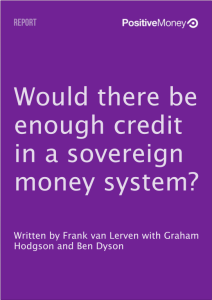Banks can be stripped of money creation power without starving economy of credit (New Report)


Positive Money has today released a report showing that stripping the banking sector of its ability to create money, a proposal endorsed by e.g. Martin Wolf, Chief Economics Commentator of FT, would not result in a shortage of credit.
Some economists, journalists and politicians have claimed that Sovereign Money proposals, in which banks are not permitted to create money, would result in the economy suffering from a shortage of credit. Therefore, proponents of this argument state that this would result in high unemployment, low levels of economic activity, and potentially a deflationary disaster.
The report released today deconstructs the underlying assumptions behind the criticisms with empirical evidence.
The report begins by demonstrating that bank lending is neither the largest nor most significant source of credit to businesses. Next, the report shows that contrary to many mainstream assumptions, businesses need greater spending by customers before they need banks to increase their respective lines of credit.
The key finding of the report is that the recycling of loan repayments that would only be possible in a Sovereign Money system, coupled with savings, would be sufficient to fund business lending and a non-inflationary level of mortgage and consumer lending.
The report ends by showing that money creation under the current system does not provide an appropriate (or optimal) amount of money to the economy, and the vast majority of newly created money does not contribute directly to growth in GDP.
Ultimately, a convincing case is made for a Sovereign Money system, which would be able to provide an adequate (but not inflationary) level of credit to the economy.
Read the report (PDF, 37 pages)